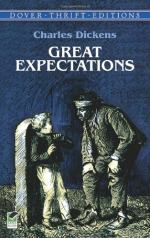Old London Bridge was soon passed, and old Billingsgate market with its oyster-boats and Dutchmen, and the White Tower and Traitor’s Gate, and we were in among the tiers of shipping. Here, were the Leith, Aberdeen, and Glasgow steamers, loading and unloading goods, and looking immensely high out of the water as we passed alongside; here, were colliers by the score and score, with the coal-whippers plunging off stages on deck, as counterweights to measures of coal swinging up, which were then rattled over the side into barges; here, at her moorings was to-morrow’s steamer for Rotterdam, of which we took good notice; and here to-morrow’s for Hamburg, under whose bowsprit we crossed. And now I, sitting in the stern, could see with a faster beating heart, Mill Pond Bank and Mill Pond stairs.
“Is he there?” said Herbert.
“Not yet.”
“Right! He was not to come down till he saw us. Can you see his signal?”
“Not well from here; but I think I see it. — Now, I see him! Pull both. Easy, Herbert. Oars!”
We touched the stairs lightly for a single moment, and he was on board and we were off again. He had a boat-cloak with him, and a black canvas bag, and he looked as like a river-pilot as my heart could have wished. “Dear boy!” he said, putting his arm on my shoulder as he took his seat. “Faithful dear boy, well done. Thankye, thankye!”
Again among the tiers of shipping, in and out, avoiding rusty chain-cables frayed hempen hawsers and bobbing buoys, sinking for the moment floating broken baskets, scattering floating chips of wood and shaving, cleaving floating scum of coal, in and out, under the figure-head of the John of Sunderland making a speech to the winds (as is done by many Johns), and the Betsy of Yarmouth with a firm formality of bosom and her nobby eyes starting two inches out of her head, in and out, hammers going in shipbuilders’yards, saws going at timber, clashing engines going at things unknown, pumps going in leaky ships, capstans going, ships going out to sea, and unintelligible sea-creatures roaring curses over the bulwarks at respondent lightermen, in and out — out at last upon the clearer river, where the ships’ boys might take their fenders in, no longer fishing in troubled waters with them over the side, and where the festooned sails might fly out to the wind.
At the Stairs where we had taken him abroad, and ever since, I had looked warily for any token of our being suspected. I had seen none. We certainly had not been, and at that time as certainly we were not, either attended or followed by any boat. If we had been waited on by any boat, I should have run in to shore, and have obliged her to go on, or to make her purpose evident. But, we held our own, without any appearance of molestation.
He had his boat-cloak on him, and looked, as I have said, a natural part of the scene. It was remarkable (but perhaps the wretched life he had led, accounted for it), that he was the least anxious of any of us. He was not indifferent, for he told me that he hoped to live to see his gentleman one of the best of gentlemen in a foreign country; he was not disposed to be passive or resigned, as I understood it; but he had no notion of meeting danger half way. When it came upon him, he confronted it, but it must come before he troubled himself.




